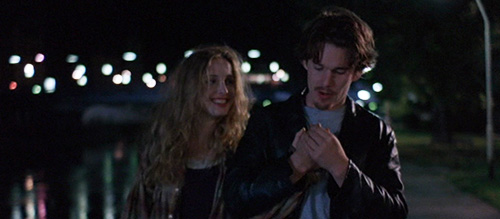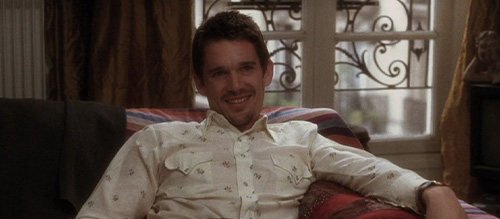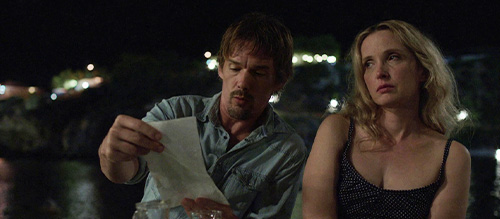The Before Trilogy: How to Capture a Moment
If film is meant to capture moments, there’s hardly a better example of that than Richard Linklater’s Before Trilogy. A love story, after all, is made up of moments: eyes meeting, hands touching, heartbreak, forgiveness. Each instalment in this trilogy concerns itself with one of these moments — when you fall in love, when you reconnect, and when you may lose it all — and creates a narrative that simultaneously shows a love story and the process of actually loving someone. This is what the Criterion Collection means when it describes the trilogy as an exploration of “cinematic time” — a tight, ninety-minute experience that simultaneously extrapolates an instant and condenses a lifetime. These are films that show us what it means to live in those moments, and what it means to be human.

Before Sunrise could be described as a pedestrian film: it mainly follows two people walking, after all. The relationship, however, is the beating heart that keeps the film alive, reminding us that what really matters is the company. Linklater’s original script was the subject of heavy rewrites from the film’s leads, Julie Delpy and Ethan Hawke, to whom the romantic flow of the material can be credited. And flow the romance does – Delpy and Hawke have a witty and dynamic chemistry and their precise blocking, wordplay, and subtle signs of rapture pull us into the story.
Take, for example, the poem. As Celine and Jesse have their first fight, the couple is approached by the “Viennese variation of a bum” who tells them if they give him a word, he will write them a poem. In contrast to that poem, which clearly describes how the two feel about one another, the dialogue and blocking of this scene works to illustrate how much Celine and Jesse are holding back from one another. They walk close enough to hold hands, but never touch. While waiting for the poet, the pair nervously lean on either side of a stone corner and separate themselves in a literal, physical way.
This lack of contact and connection is reflected in the dialogue. They laugh often, their body language exaggeratedly “cool”. Celine flirtatiously frames conflict as romantic while Jesse postures, talking about his ingrained sense of competition. Celine asks if Jesse had approached her trying to win her in some way, and as the poet interrupts that train of thought, we see that Jesse is leaning on the wall in a gesture of strained relaxation.
Their conversation is light and full of banter, but the language of the scene tells us so much more. That early feeling of love – the stress of presenting your best self and the hopeful fun of flirting – is clearly broadcasted, evoking something between schadenfreude and second-hand embarrassment. And yet, it is resolved in the soft, loving looks Celine and Jesse cast at one another when only the bum and the audience can see.

The final scene of Before Sunset features the pair in Celine’s apartment while Jesse’s driver waits outside. In this moment, the main tension of the film – the ticking clock of Jesse’s flight – is drawing close. That ticking clock, and the choice Jesse is struggling with, is represented in the blocking of the scene. Jesse reclines on Celine’s couch while she paces, talking to him. The door is in clear view anytime the shot is from Jesse’s perspective, but Celine is always in front of it. To go through the door and make his flight, he would have to confront Celine and physically leave her behind again.
We are anxious in the same way that we are torn – we do not want Jesse to leave, but we also do not want the final grains of sand to filter through the hourglass. Jesse, however, is relaxed. There is a light in his eye that has been growing throughout the movie. Their dialogue is noticeably less quippy here, now that they have borne their older and more damaged souls to one another. In a secluded space, they are noticeably more relaxed, no longer posturing. Everything about them evokes the feeling of talking with someone who makes you forget about time, of conversations that last so much longer than they need to but are still far too short. For the first time in the film, there is no undercurrent of resentment, no double-speak or bitter banter. Moments after Jesse describes his home as cold and without laughter, they are in a space that is visually relaxed and warm. When Celine tells Jesse that he’s going to miss his flight, he fidgets with his wedding ring and agrees. And as he smiles at Celine’s Nina Simone impression, he laughs and the credits roll.

Before Midnight is a significant departure from the previous two movies. Gone is the romanticism and the sandstone color-grading. This movie is blue and cynical. The dialogue has shed much of its playful philosophy and introspection, opting instead for acerbic and cutting. They are both so far from who they were in Sunrise, growth stemming from the pain we saw in Sunset. They have grown cynical and insecure, and have forgotten one another along the way. Where the previous movies captured the sense of possibility inherent in falling in love, this one captures two things: the deep and anxious fear that your choices have wasted your life, and the difference between the emotion and the labor of love.
The climax of this film is a hotel room, a Blue Valentine-style trip to rekindle their romance. As Jesse’s anxieties about the son he left in the US and Celine’s postpartum depression tangle about one another, the fight brewing steadily throughout the movie begins. And as it does, interrupting their intimacy, Celine confronts Jesse while topless. As they discuss their children and her role as a woman, it is as if she is weaponizing what was seconds ago a symbol of sexual desire. As Jesse avoids looking at her, it is clear that he knows he is hurting her, but that his own hurt is too great for him to stop. All her anxieties of childbirth, motherhood, stepmotherhood, and betrayed feminism that will be hashed out over the next twenty minutes are foreshadowed as Celine lounges, statuesque, glaring at Jesse as he contradicts her about Medea’s origins.
They are both bitterly cold to one another, contrasting the supposed intimacy of the moment. They are barbed and harsh, and every word they say carries some weight of their nine years together. It feels utterly hopeless. And yet, proving for a third time that this creative team can be trusted, it resolves. Jesse attempts to meet Celine halfway, his olive branch a story, a “fairytale” for her to play into. It is so simple and sweet, and even though they have both been cruel to one another, there is a rejoicing in the smiles on their faces when Celine engages with the story he has presented.
For a series so heavy on monologue, it’s the direction of these films that serves to convince the audience that these moments are real. Whether it’s furtive looks at one another in the listening booth, Celine almost (but not quite) reaching out for Jesse in the car, or the resounding silence Jesse and the audience are left with when Celine slams the door the final time. The intensity of these moments is so tangible in its expression, in the way that a lifetime of emotion and experience is conveyed. As if anyone at any time could watch them and be transported to a moment of falling in love or realizing that you’ve hurt someone you care so deeply for.
These are exceptional pieces of film, a take that is neither hot nor disputed. But in a cinematic landscape flooded with franchises engineered by corporations to sell us standardized stories and overpriced popcorn, it’s nice to be reminded of what it means to capture a moment. These are inherently and incredibly human films. There are no pillars of morality, just people who make mistakes and do their best to live with and face the consequences of those mistakes. These moments, captured in 35mm glory, capture what it is to be alive – to be messy, to hurt and be hurt, and to continue, harried but undaunted.
Written by Jack Fanning
Recommended for you: Ravished by Romance – Before Sunrise’s Antithetical Approach to Love

